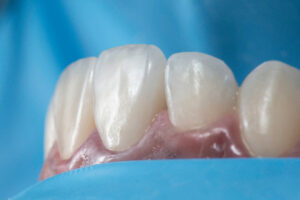You already go to great efforts to care for your dental health and enhance your smile. Brushing, flossing, and scheduling dental exams and cleanings become a regular part of your good oral hygiene practice and can even improve your overall health.
Yet, there may be times when you want to improve the cosmetic appearance of your teeth or resolve a few minor dental flaws. When this happens, a beneficial solution to consider is dental bonding.
What is Dental Bonding?
Simply put, dental bonding is a procedure involving the application of natural-looking composite resin to a tooth’s surface and allowing it to cure or harden. This hardening occurs with the help of a directed LED light, creating a reliable seal between the tooth and the resin.
As a cosmetic procedure, dental bonding is best suited for those with minor dental flaws, including the replacement of silver fillings. The resin itself is designed to closely match the color of existing teeth, creating a more natural smile to share with confidence. The surface of your bonded tooth will be smooth and feel much like your natural teeth also.
5 Awesome Things That Happen When You Get Dental Bonding
Awesome things happen when you choose dental bonding to enhance your smile and address those smaller dental issues. Here are five of those things.
1. Brightens Your Smile
Over time, tooth color can become dull, even yellowing. While you may do your best to care for your dental health, sometimes you need help brightening up your teeth and creating a better aesthetic experience.
To accomplish this, you may need dental bonding on one or two teeth or on all of the ones that show each time you flash your smile. The advantage to dental bonding is that you can use it on almost any number of teeth to brighten your smile.
2. Tooth Enamel Stays Safe
With dental bonding, not only do your teeth look better when you smile, but the tooth enamel underneath stays safe. This safekeeping is not always the case with veneers or other cosmetic options today. In addition, the bonding creates a barrier between the tooth and mouth bacteria, and this can prevent tooth enamel erosion or cavities from forming.
3. Minor Dental Flaws Disappear
Matching the color of the bonding resin with the natural color of your teeth can hide minor dental flaws easily. More precisely, dental bonding can:
- eliminate the look of discolored or stained teeth,
- repair cracked or chipped teeth,
- fill gaps between your teeth,
- create a uniform appearance, and
- replace the need for silver or amalgam fillings
4. Teeth That Require Fillings Stay Protected
Dental bonding is a perfect solution for replacing those old silver fillings as well as dental amalgams (mixed metal fillings). In the past, these types of fillings could potentially seep poisonous substances into your body without you even knowing it.
In contrast, the composite resin in dental bonding is considered biocompatible, which means it is compatible with body tissue and does not produce toxicity when interacting with saliva or other bodily fluids.
As an additional bonus, when the bonding material is applied to the tooth, a strong seal occurs, protecting the site of the original filling from germs and the development of infections.
5. Your Beautiful Smile Can Last for Years
Cosmetic bonding of teeth can last for years and not require repairs or reapplications. Much of that will depend, of course, on how well you care for your teeth overall.
In general, expect bonding to last between five and ten years. After that, your dentist will more than likely need to touch up the existing bonding. In some cases, it may need full replacement.
The lifespan of dental bonding will rely on several factors, including:
- location of bonding material (e.g., front teeth),
- the amount of bonding material applied,
- the condition of the teeth under the bonding, and
- potentially damaging habits, such as nail-biting.
How To Care for Dental Bonding
Dental bonding can last for years as long as you take care of the teeth underneath as well as the gums. You also want to prevent excessive staining and discolorations from occurring.
Here are tips to help you care for your bonded teeth for years to come.
- Continue with your normal oral hygiene practice. Brush twice a day with a clean, soft-bristled toothbrush, floss often, and use an alcohol-free mouthwash.
- Limit beverages and foods that may stain your bonding, including red wine, berries, coffee, or tea.
- Stay away from sugary and acidic beverages, including tea, coffee, soft drinks, and fruit juices. These acidic drinks can soften tooth enamel and bonding and result in decay and cavities.
- Avoid using your teeth as convenient tools to open packages, trim your nails, or open bottle caps. These activities can break or damage the bonded teeth.
- Resist hard or sticky foods, including ice cubes, nuts, hard pretzels, and some candies.
- Wear mouthguards if you participate in sports or a nightguard if you grind your teeth (bruxism) at night.
- Regularly schedule routine dental cleanings and exams.
Find Out More About Dental Bonding by Contacting Stiles Dental Care Today
When looking for ways to enhance your smile and improve your overall oral health, dental bonding may be just the solution you need. To find out more, or discuss other ways to meet your dental health goals, contact Dr. Stiles and his team at Stiles Dental Care today to schedule an appointment.
